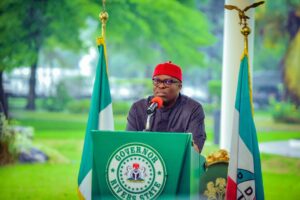Port Harcourt, Nigeria – The political landscape of Rivers State has been embroiled in a series of confrontations between the executive and legislative branches, culminating in recent allegations of constitutional violations against Governor Siminalayi Fubara by the State House of Assembly.
Assembly’s Allegations Against Governor Fubara
On March 5, 2025, the Rivers State House of Assembly, under the leadership of Speaker Martin Amaewhule, issued a formal communication to Governor Fubara, detailing multiple instances of alleged constitutional infractions. The Assembly’s letter highlighted the following concerns:
-
Unlawful Appointments: The Assembly accused Governor Fubara of appointing individuals to various state positions without the requisite screening and confirmation by the legislative body. Notably, the appointment of Mr. Dagogo Iboroma as Attorney-General and Commissioner for Justice was cited as a direct contravention of Sections 192 (2) & (6) and 195 (1) of the 1999 Constitution.
-
Unauthorized Swearing-In of Commissioners: The Governor was alleged to have sworn in several individuals as commissioners on May 21, 2024, without legislative approval, thereby violating constitutional provisions.
-
Irregular Appointments to the Public Procurement Bureau: The Assembly claimed that on August 30, 2024, Governor Fubara appointed members to the Rivers State Bureau on Public Procurement without following due process, specifically without the Assembly’s screening and confirmation, as mandated by Section 4 (a) of the Rivers State Public Procurement Law No. 4 of 2008.
-
Unconstitutional Appointments to the Local Government Service Commission: The Governor was also accused of appointing individuals to the Rivers State Local Government Service Commission without adhering to the necessary legislative procedures, thereby breaching Section 44 (3) of the Rivers State Local Government Law No. 5 of 2018.
In response to these allegations, the Assembly issued a 48-hour ultimatum to Governor Fubara to submit a list of nominees for the aforementioned positions for proper legislative screening and confirmation. Failure to comply, the Assembly warned, would result in unspecified consequences.
Governor Fubara’s Legal Challenges
The tensions between the executive and legislative branches have been further exacerbated by recent judicial proceedings. On February 10, 2025, the Supreme Court dismissed an appeal filed by Governor Fubara challenging the legitimacy of the Martin Amaewhule-led faction of the Rivers State House of Assembly. The apex court’s decision effectively affirmed the authority of the Amaewhule-led Assembly, dealing a significant blow to Governor Fubara’s legal standing.

Historical Context: A Pattern of Discord
The current discord is not an isolated incident but part of a series of confrontations that have marred the state’s political environment:
-
December 2023 Impeachment Attempt: In December 2023, a faction of the Assembly initiated impeachment proceedings against Governor Fubara, citing various allegations of misconduct. However, following the intervention of President Bola Tinubu, a peace agreement was brokered, leading to the withdrawal of the impeachment notice.
-
Demolition of Assembly Complex: On December 13, 2023, the Rivers State House of Assembly complex was demolished under the supervision of Governor Fubara. The state government justified the demolition by declaring the building structurally defective. This action further strained relations between the executive and legislative branches.
Current Legal Battles
The ongoing power tussle has also spilled into the judiciary. The legitimacy of Governor Fubara’s appointment of 19 commissioners is currently under judicial scrutiny. These commissioners have approached the State High Court, seeking to restrain the Amaewhule-led Assembly from declaring their appointments illegal. This legal battle underscores the deepening crisis and the complexities involved in the state’s governance.
Implications for Governance
The persistent conflicts between Governor Fubara and the State House of Assembly have significant implications for governance in Rivers State:
-
Policy Paralysis: The ongoing disputes have the potential to stall legislative processes, hindering the passage of essential laws and policies crucial for the state’s development.
-
Administrative Uncertainty: The legitimacy of appointments and executive actions remains in question, leading to administrative uncertainties that could affect the effective delivery of public services.
-
Investor Confidence: Political instability may deter potential investors, adversely impacting the state’s economic growth and development prospects.
Calls for Resolution
Stakeholders and political analysts have emphasized the urgency of resolving the impasse to restore stability in Rivers State. There are growing calls for dialogue, adherence to constitutional provisions, and respect for the rule of law as fundamental steps toward achieving lasting peace and effective governance in the state.
Conclusion
The unfolding political crisis in Rivers State presents a critical challenge to its democratic institutions. The allegations against Governor Fubara by the State House of Assembly, coupled with ongoing legal battles, underscore the need for a concerted effort to uphold constitutional principles and ensure that the state’s governance structures function harmoniously for the benefit of its citizens.



